Intellectual Virtue and Science Education Consultation
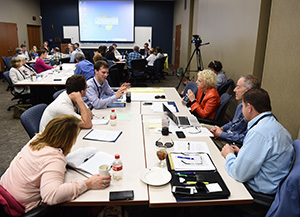
Thursday May 11 – Saturday May 13
Location
McKenna Hall, University of Notre Dame
Purpose
Facilitate dialog between philosophers, psychologists, and science educators about the incorporation of intellectual virtue into science education, especially at colleges and universities. Learn about the consultation background.
Outcomes
First, an edited volume addressing specific questions about how science curriculum could be modified to better develop intellectual virtue in scientists being educated and trained. Second, practical recommendations about future science curriculum for undergraduate and graduate students. Third, future collaborations and research projects, both and within and outside of Notre Dame.
Plan
Scholars and students, external and internal to Notre Dame, will be given the opportunity to discuss specific questions and share their own insights and knowledge.
Participants
Scholars and students both from within and outside Notre Dame have been invited to participate, including:
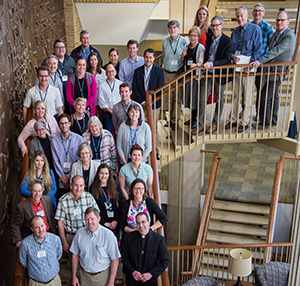
Jason Baehr, Dept. of Philosophy, Loyola Marymount University
Rich Bollinger, Character Virtue Development Program, Sir John Templeton Foundation
Clark Chinn, Dept. of Educational Psychology, Rutgers University
Howard Curzer, Dept. of Philosophy, Texas Tech University
Andrew Elby, Department of Teaching, Learning, Policy, and Leadership, University of Maryland
Sally Entrekin, Dept. of Biology, University of Central Arkansas
Michelle Francl, Dept. of Chemistry, Bryn Mawr College
Jessica Gottieb, Dept. of Curriculum and Instruction, Texas Tech University
Barbara Hofer, Dept. of Psychology, Middlebury College
Cassandra Horri, Director, Center for Teaching, Learning, and Outreach, California Institute of Technology
William Sandoval, Dept. of Education, University of California – Los Angeles
Nancy Snow, Director, Institute for the Study of Human Flourishing, University of Oklahoma
Lani Watson, Institute for the Study of Human Flourishing, University of Oklahoma
Jay Wood, Dept. of Philosophy, Wheaton College
Also, many faculty, graduate and undergraduate students from the University of Notre Dame, including those from the Virtuous Scientist Internal Advisory, Biological Sciences Graduate, and Science Working Groups, Intellectual Virtues and Science Education Directed Readings Course, and the Developing Virtues in the Practice of Science Project.
Support and Sponsorship
In addition to support from the Sir John Templeton Foundation, others supporting the colloquium include the Institute for Educational Initiatives, Institute for Scholarship in the Liberal Arts, the College of Science, Dept. of Biological Sciences, the Center for STEM Education, and the Kaneb Center for Teaching and Learning.
Schedule
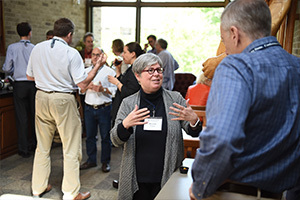
Thursday May 11
5:30 pm - Registration (Eck Center)
6:00 - 7:00 pm - Reception
7:00- 9:00 pm - Dinner and Remarks (Eck Center)
Welcome and Orientation to Consultation
Dominic Chaloner, Department of Biological Sciences, University of Notre Dame,
Principal Investigator: Virtuous Scientist Project
8 pm (approx) - After Dinner Remarks: “Intellectual Virtues, Epistemic Practice and Scientific Identity”
Daniel Lapsley, Department of Psychology, University of Notre Dame
Friday May 12
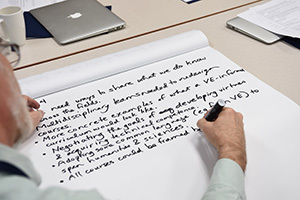
8:00 am - Registration and Breakfast (East Lounge, McKenna Hall)
9:00 am - Welcome to Notre Dame (210-214, McKenna Hall)
Mary Galvin, William K Warren Foundation, Dean of College of Science, University of Notre Dame
9:05 am - First Session (Moderated by Dan Lapsley) (210-214, McKenna Hall)
“What should scientists and science educators know about epistemic reasoning?”
10:30 am - Break (East Lounge, McKenna Hall)
10:45 am - Second Session (Moderated by Dan Lapsley) (210-214, McKenna Hall)
“What is the practical relationship between virtue epistemology and epistemic cognition, and what are the implications for development and assessment of science education and training?”
12:15 pm - Lunch (McKenna Dining Room, Lower Level, McKenna Hall)
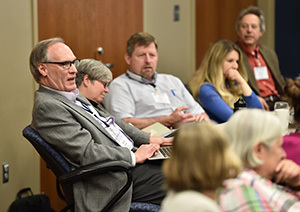
1:30 pm - Third Session (Moderated by Dom Chaloner) (210-214, McKenna Hall)
“Where are there meaningful connections among the three domains of virtue epistemology, epistemic cognition and science education? How can we bolt together these domains?”
3:00 pm - Break (East Lounge, McKenna Hall)
3:15 pm - Fourth Session (Moderated by Dom Chaloner) (210-214, McKenna Hall)
“Where is there lack of knowledge, and what are the promising areas of integrative study in applied epistemology in science (education)?”
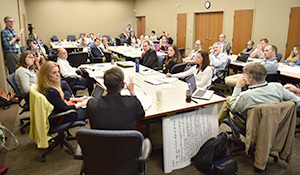
4:30-4:45 pm - Exit Poll and Adjournment
Campus Tour (Optional)
6:00 - 7:00 pm - Reception
7:00- 9:00 pm - Dinner and Remarks (Jordan Hall Reading Room)
8 pm (approx) - After Dinner Remarks: “Teaching Intellectual Virtues in University Education”
Mark Roche, Department of German and Russian Languages and Literatures, University of Notre Dame
Saturday May 13
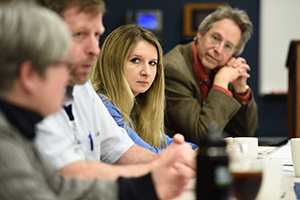
9:00 am - Summary of Friday Sessions (Dom Chaloner) (210-214, McKenna Hall)
9:15 am - Fifth Session Small Group Work (Moderated by Matt Kloser, ND Center for STEM Education) (210-214, McKenna Hall)
Drawing on one or more of the audiences of students, faculty, and administration, identify a model for integrating intellectual virtue and epistemic cognition into the undergraduate science learning ecosystem. Identify an important part of developing the model that could lead to a multi-disciplinary and multi-institutional collaboration.
10:15 am - Sixth Session (Moderated by Matt Kloser) (210-214, McKenna Hall)
Group Share Out of Models and First Step Projects and Plenary Discussion
11:30 am - Wrap-Up (Dom Chaloner) (210-214, McKenna Hall)
Consultation summary, future directions, and bon voyage!
12:00 pm - End of consultation